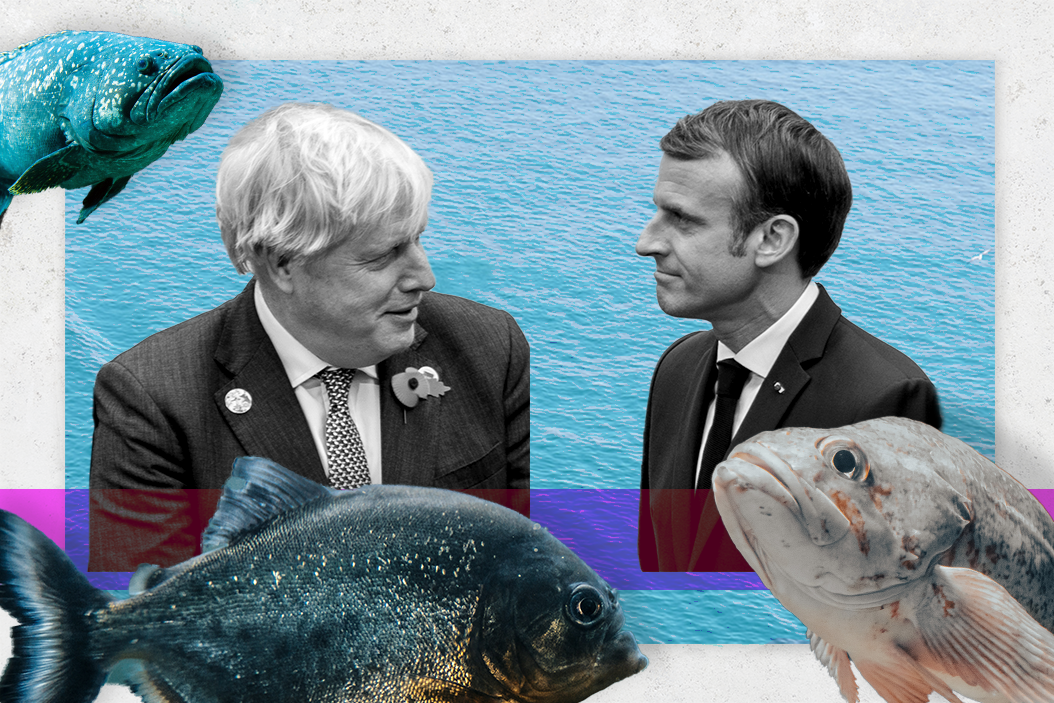November 03, 2021
Fish are divisive. Their various odors are distinctive, and though some people enjoy them, others find their slimy exteriors off-putting.
They also can drive a wedge between longtime "friends" like France and the UK. In recent weeks, Prime Minister Boris Johnson and President Emmanuel Macron have been at loggerheads over questions of fishing access in the English Channel. But is this latest row really about roe?
Le contexte. The fishing issue was one of the final sticking points in the post-Brexit deal, which came into force earlier this year. Now, EU member states' boats need special licenses to fish in British waters, and vice-versa. The French say that they haven't been granted a stack of licenses they're entitled to under the deal – the Brits say they've granted 98 percent of all EU fishing applications. Whatever the truth, about one-third of the licenses France has asked for have not yet been granted.
Rotting fish. Tensions are high, and tempers are running hot. Last week, the French seized a British trawler that it accused of fishing unlawfully in its waters. Macron has also issued a series of threats, including a warning that Paris would tax British exports and delay processing at its ports, which could leave a lucrative stash of fish to rot. Though Macron has backed off for now, things have gotten pretty acrimonious: a leaked letter that French PM Jean Castex wrote to EU Commission President Ursula von der Leyen this week reportedly called on London to be "punished" for Brexit.
Still, fish exports account for a measly 0.1 percent of the UK's GDP, and 0.06 percent of France's economy. Clearly, this fight isn't just, or even mainly, about fish.
What's in it for Boris? Johnson has had a rough time of it lately, and he may be hoping that a fight with the French – whom Britons love to hate – might provide a nice distraction from a string of crises causing frustration and angst at home. Supply-chain disruptions fueled by the pandemic and Brexit have British nerves on edge, while energy shortages are sending prices sharply higher. Morale among Britons is low as a frosty winter looms.
Economic conditions may well get worse. As London grapples with post-Brexit shocks, Germany, Europe's biggest economy, says the UK is likely to fall out of the country's top 10 trading partners for the first time in seven decades. That matters much more than any fight over fish.
Moreover, Johnson is locked in a bitter stalemate with the EU as he tries to renegotiate the conditions of the Northern Ireland Protocol – a post-Brexit arrangement that the PM says is disrupting the flow of goods between London and Belfast. Johnson could be buying time with the French drama so he can trigger a legal loophole that would allow him to renege on the Protocol. (However, he likely wants to wait until his international guests leave the COP26 summit in Glasgow.)
The French are always grumpy in October. This was the analysis from a Tory MP on what's aggravating the French so much. (He was slyly referring to the anniversary of the Battle of Trafalgar, a fight in which the British prevailed over Napoleon's navy in 1805.)
A more likely explanation: French domestic politics plays a sizable role in Macron's calculus. As the euroskeptic right gains momentum ahead of French presidential elections in April, Macron is on a mission to make an example of Britain, and to convince voters that France can impose serious costs on those who ditch the EU and disrespect hard-working French fishermen. It's a popular position for a leader facing a tighter-than-hoped-for race for re-election next year.
Macron also likely wants to make the point that France won't be pushed around by a British leader he regards as unserious. After a recent Australian decision to form a security partnership with the US and Britain – and to buy US rather than French submarines – surprised and embarrassed him personally, the French president likely wants to assert that he's no pushover and set a precedent for bigger post-Brexit negotiations to come.
Fish matter, but the real drama lies ahead when the UK tries to maneuver its way out of post-Brexit arrangements it previously committed to. When that happens, Johnson won't have just the French on his case.
More For You
A photograph posted by U.S. President Donald Trump on his Truth Social account shows him sitting next to CIA Director John Ratcliffe as they watch the U.S. military operation in Venezuela from Trump's Mar a Lago resort, in Palm Beach, Florida, U.S., January 3, 2026.
@realDonaldTrump/Handout via REUTERS
Most Popular
- YouTube
In this "ask ian," Ian Bremmer analyzes Trump’s recent meeting with Zelensky and how close (or far) Russia and Ukraine are from a peace deal.
Syrian President Ahmed al-Sharaa attends the military parade of the Syrian army in Umayyad Square in central Damascus to mark the one-year anniversary of the fall of the Assad regime, on Dec. 8, 2025.
Mohammed Al-Rifai/dpa via Reuters Connect
A year ago this month, Syria’s brutal dictatorship collapsed. There are signs of recovery, but sectarian violence threatens to undermine the optimism.
© 2025 GZERO Media. All Rights Reserved | A Eurasia Group media company.
